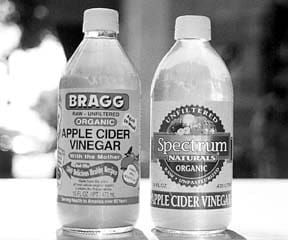[Updated October 5, 2017]
You’ve heard of the benefits humans reap from apple cider vinegar, but is it safe for dogs? Apple cider vinegar, or ACV, is great for dogs’ health. Dogs benefit from using apple cider vinegar in nearly every way people do, both topically and by drinking it.
Apple cider vinegar begins life as apple juice or sweet cider. Then, fermentation of the yeast and natural sugars occurs, creating alcoholic or “hard” cider, to which a vinegar “mother” is added. The mother forms a gooey, slimy mass on the surface of hard cider, inoculating it with aerobic bacteria that convert alcohol to acetic acid, creating a new generation.
If you have ever made sourdough bread from a sourdough “starter,” you understand the concept. Cider vinegar mothers, some of which are centuries old, can be purchased from brewing supply companies or simply saved from a raw, unpasteurized, unfiltered cider vinegar that contains it, such as Bragg Organic Apple Cider Vinegar.
Vinegar sold in the United States is at least 4 percent acetic acid, and most is between 5 and 7 percent acetic acid, the strength recommended for pickle making. Water is added to freshly brewed or distilled cider vinegar to dilute it to that strength. Brew supply companies sell inexpensive test kits for measuring the acetic acid in homemade or orchard-brewed cider vinegar.
Raw, unfiltered, unpasteurized cider vinegar contains all of the nutrients that survive the processes of fermentation and oxygenation, and its contents look suspicious, with bits of murky sludge drifting around or settled at the bottom. Don’t wrinkle your nose; this sediment is the signature of the most highly prized raw vinegars on the market.
Those who are old enough remember when Dr. D.C. Jarvis of Vermont made apple cider vinegar a household word with his 1958 best seller, Folk Medicine. According to Jarvis, native Vermonters used cider vinegar to cure migraine headaches, arthritis, diabetes, obesity, indigestion, and a host of other ailments.
ACV enthusiasts say that the apple cider vinegar remedies the same multitude of conditions in dogs, including:
1. Relieves or prevents arthritis
2. Improves digestion
3. Acts as a urinary system tonic, clears urinary tract infections, and prevents the formation of kidney and bladder stones
4. Improves the growth and condition of fur and hair
5. Good home remedy for bacterial and fungal infections
6. Reduces dog’s itchy skin, flaking, and dander
7. Makes one less attractive to biting insects like fleas
8. Helps prevent food poisoning
9. Acts as a natural antibiotic for dogs by interrupting the development of infectious bacterial and viral diseases
10. Relieves muscle fatigue
11. Alleviates itching
12. Improves ability to adapt to cold temperatures
13. Works as a home remedy for hock and elbow calluses
14. Works as a remedy to clear and prevent ear infections in dogs
For a more detailed list of ways ACV can be used for dogs, read “Apple Cider Vinegar,” (March 2017) by Cynthia Foley.
Many orthodox veterinarians scoff at such claims because they have never been subjected to the rigors of double-blind, placebo-controlled clinical trials. Instead they are supported by personal experiences, testimonials, and other anecdotal evidence.
Barbara Werner first tried apple cider vinegar when her golden retriever, Kate, was 10 months old. Because the puppy was allergic to chemical flea products, Werner was looking for a nontoxic repellent, and a show judge recommended cider vinegar.
Werner began adding ACV to her dogs’ food and drinking water, and she diluted it with water to spray on their coats. That was 11 years ago. Werner has been using it ever since, and Kate is still flea-free.
“In combination with a raw diet and garlic, it keeps biting insects away,” she says, “and I think it improves the dogs’ digestion and makes their coats glossy. I usually add it to the food processor when I puree their raw vegetables, and each dog takes about one tablespoon of cider vinegar per day.”
ACV is a natural preservative that inhibits the growth of bacteria, so it extends the refrigerator shelf life of pureed vegetables to a week or longer, making the blend convenient as well as nutritious.
Because it has a distinctive taste, Tellington TTouch practitioner Karen Doyle of Chester, New York, recommends cider vinegar as a flavoring agent. “When dogs travel,” she explains, “they are sometimes unwilling to drink water that smells and tastes different from what they are used to at home. Most dogs adapt quickly to the taste of apple cider vinegar and will drink any water to which small amounts have been added. Cider vinegar is inexpensive insurance against dehydration.”
Raw VS. Pasteurized Apple Cider Vinegar (and Why It’s Good for Dogs)
Although promoted as a nutritional powerhouse and an unequaled source of vitamins and minerals, especially potassium, cider vinegar contains less potassium than many if not most unprocessed foods. It has only minute amounts of other minerals, and its vitamin content is negligible.
Raw, unpasteurized cider vinegar does contain enzymes and other fragile nutrients that are destroyed by the heat of pasteurization or distillation. Advocates of cider vinegar usually recommend raw, unfiltered, unpasteurized vinegar that comes complete with traces of the “mother,” a slimy sediment that contains the bacteria necessary for conversion from hard cider to vinegar.
Unpasteurized ACV’s enzymes are said to improve digestion. “In addition,” says Beverly Cappel, D.V.M, “apple cider vinegar acidifies the gastrointestinal tract and promotes the growth of beneficial bacteria. All of these factors are important to digestion.”
Stomach acid is essential to the breakdown and assimilation of proteins, and when age, stress, or other factors reduce the stomach’s secretion of hydrochloric acid (HCl), the result is incomplete digestion. Jonathan Wright, M.D., often writes about the links between HCl production and the condition of human hair and nails.
According to Wright, the incomplete digestion of protein caused by insufficient HCl is the leading cause of weak, brittle nails and hair. Nutritionally oriented physicians often recommend vinegar, lemon juice, or HCl supplements with meals for patients who complain of digestive distress or who have weak, splitting fingernails.
When dog owners add small amounts of apple cider vinegar to their animals’ feed and notice a gradually improving coat, stronger nails and firmer muscle tone, the reason may be improved protein digestion resulting from an increase of acid in the stomach.
Topical Applications of Apple Cider Vinegar
Apple cider vinegar can be diluted half-and-half with water for external application, and, when stronger measures are needed, it can be used full-strength.
When the male dogs attending a New England dog show experienced an incapacitating allergic reaction that made their testicles swell, Volhard declined the steroid shot offered by the attending veterinarian and instead applied ACV to the legs, testicles, and exposed skin of Cato, her male Newfoundland. The next morning he was completely well and took a High in Trial, while the other affected dogs needed weeks to recover. Volhard recommends ACV for dogs as a hot spot home remedy and preventive, itch stopper, general disinfectant, virus deterrent, food poisoning preventive, and flea and tick repellent.
Apple cider vinegar can be sponged onto a dog’s coat after a bath to remove soap residues and improve hair condition. Vinegar’s acidity and live enzymes are said to kill bacteria that cause flaking skin conditions. Soak the coat to the skin and let it air-dry. This same treatment is said to repel fleas and ticks. Rinsing a dog with apple cider vinegar after shampooing prevents dander. Just please note that apple cider vinegar will stain the coats of lightly colored dogs. For white dogs, substituting white vinegar works fine.
Apple cider vinegar cools the skin when applied to burns, wounds, or hot spots. You’ll want to apply full-strength ACV to topical wounds. It can be massaged into sore or sprained muscles and is the foundation of many herbal liniments that relieve pain and inflammation.
To maximize apple cider vinegar’s benefits for your dogs’ skin, add to it a blend of calendula, comfrey and St. John’s Wort before applying.
Apple Cider Vinegar Controversy
Not everyone, however, agrees that apple cider vinegar should be given to dogs. Pat McKay, canine nutritionist and author of the natural diet book Reigning Cats and Dogs, doesn’t like cider vinegar, and she doesn’t mince words; she calls it poison.
“I believe Peter J. D’Amado is on the right track in his book, Eat Right for Your Type,” she says. “Each of the human blood types has an ideal diet, and the diet recommended for type O most closely resembles the meat-based diet on which dogs evolved. D’Amado warns that cider vinegar is very damaging to this type, and I agree with him. I happen to be a type O, and apple cider vinegar has always made me feel miserable. I never knew why until I read his book. I believe dogs have a similar reaction because even small quantities of vinegar can throw their bodies’ pH out of balance.”
Marina Zacharias, pet nutritionist and publisher of Natural Rearing newsletter, shares McKay’s concern about pH levels. She recommends that owners have their dogs’ blood and urine tested before adding cider vinegar to their daily diet.
“If a dog’s system is too alkaline,” she says, “cider vinegar will help, but by itself it may not correct the problem and the dog will need additional support. If the dog’s system is too acidic, which is a condition called acidosis, the result can be stress on the pancreas and adrenal organs, which are important regulators of blood pH levels. The symptoms of acidosis range from diarrhea or constipation to low blood pressure, hard stools, and sensitivity of the teeth and mouth. Often we see acidosis in combination with other conditions, such as kidney, liver, and adrenal problems. In certain cases, adding vinegar to a dog’s food could aggravate an already-existing problem in the body.”
Are adverse side effects likely? If a dog is allergic to vinegar, he might vomit, scratch furiously, or have a similarly obvious reaction. Although there is much debate on this issue, some believe that vinegar may worsen chronic ear infections. Long term use of ACV on dogs who are sensitive to it has been associated with tooth decay and bone deterioration. Too much could also inflame a dog’s mouth and esophagus.
“You have to apply common sense,” says Sue Ann Lesser, D.V.M. “Most dogs are notoriously over-alkaline, and cider vinegar will help them. If a dog’s system is overly acidic, you’ll see clinical signs, such as obvious symptoms of illness. I know quite a few dogs that take cider vinegar according to the directions in Wendy Volhard’s book, and I don’t know of any that have had bad results.”
In her book The Holistic Guide for a Healthy Dog, author Wendy Volhard recommends using pH paper strips to check the dog’s first morning urine. “If it reads anywhere from 6.2 to 6.5, your dog’s system is exactly where it should be,” and no ACV is needed, she says. “But if it is 7.5 or higher, the diet you are feeding is too alkaline, and apple cider vinegar will reestablish the correct balance.”
Volhard recommends one teaspoon to one tablespoon twice daily for a 50-pound dog.
Apple Cider Vinegar as a Cleaning Agent
Although vinegar’s promoters recommend raw apple cider vinegar for topical and internal use, distilled white or cider vinegar can be used as a cleaning agent, reducing your dog’s exposure to cleaning chemicals. In her book Apple Cider Vinegar, Patricia Bragg, N.D., Ph.D., lists dozens of uses for vinegar in the kitchen, bathroom, laundry room, and garden.
Some ways to use vinegar for cleaning include: disinfecting pet toys and pet bedding, deodorizing pets, using apple cider vinegar on dogs after the hydrogen peroxide treatment for skunk sprays, and getting stains out of carpets (with white vinegar).
Apple cider vinegar may be an “unproven remedy” by FDA standards, but many dog owners swear by its internal and external benefits. In the 1990s, when the 0157:H7 strain of E. coli first sickened thousands around the world, Virginia Polytechnic Institute and State University food scientist Susan Sumner, PhD, discovered that spraying vinegar and hydrogen peroxide on raw meat, vegetables, cutting boards, and other kitchen surfaces disinfected them more effectively than chlorine bleach or any commercial kitchen cleaner. Applying one after the other (in either order) with a mist sprayer killed virtually all Salmonella, Shigella, and E. coli bacteria on heavily contaminated food and surfaces. That’s a particularly helpful piece of information for those of us who raw-feed our dogs; adding a little ACV to a dog’s raw food effectively kills the dangerous bacteria that might be present.
Because it is inexpensive, widely available, nontoxic, and easy to use, apple cider vinegar will remain a popular remedy through the 21st century.
Also With This Article
Click here to view “Apple Cider Vinegar For Dogs”
Author C.J. Puotinen is an herbalist and holistic pet care expert as well as author of Encyclopedia of Natural Pet Care. A frequent contributor to WDJ, Puotinen is also author of a number of books on herbs. She lives in New York state with her husband and a Black Lab named Samantha.







q19fkHL8k
Thanks for the information because I was looking how I can helped my dog because she started to go blind
My little chiweenie Katy has bad inflammation & I rub her down with coconut oil and it helps but should I try apple cider vinegar on her,I already spray half water & apple cider vinegar on her feet every night , she licks her feet & continues to do so if I don’t…. Thank you, Carla